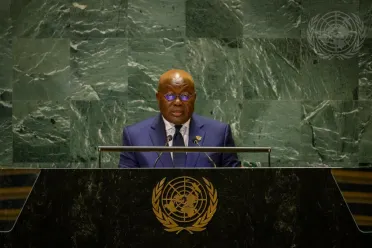Statement
Statement summary
NANA ADDO DANKWA AKUFO-ADDO, President of Ghana, said that Africa knows the cost of being left out. “Yes, we are a continent rich in potential and resilient in the face of adversity, but we have also been disadvantaged by a global system that has generally treated us as an afterthought,” he added. Africa has been “viewed merely as passive recipients of aid, rather than as equal partners in global progress”. The well-meaning promises of assistance have failed to materialize to bring about long-term change. Such aid often comes with strings attached, limiting the continent’s ability to shape its future. The people of Africa are not asking for handouts — they are demanding opportunities in a new global architecture so they can have access to education, health care and jobs, to be able to build better lives.
Ghana has taken bold and decisive steps to ensure that no one is left behind in our national development. Its Free Senior High School policy has benefitted 5.7 million young people, positioning the next generation of Ghanaians to take their place as leaders in the global economy. Ghana has also embarked on the largest-ever health-care infrastructure project in the country’s history. This initiative is constructing 111 hospitals across the country, ensuring that even the most remote regions have access to modern health-care facilities. The Programme for Planting for Food and Jobs has improved food production, created jobs and enhanced income for millions of Ghanaians. Through reforms in the judicial system, Ghana is also strengthening its democratic institutions and promoting transparency.
On the Russian Federation invasion of Ukraine, he said that millions of lives have been uprooted, thousands have lost their lives, and yet, the Security Council has struggled to respond decisively, just as it is struggling to make a decisive intervention in the tragic, ongoing war in Gaza. The structure of the Council reflects a world that no longer exists. Africa, Latin America and South Asia remain underrepresented, undermining the legitimacy of the Council’s decisions. The use of the veto power by a few permanent members often paralyses its ability to act effectively during crises. It is incomprehensible that Africa — a continent of 1.4 billion people — has no permanent voice in shaping decisions that affect global peace and security. It is heartening that, finally, the demand for reform has found acceptance by leaders of two of the five permanent members — United States President Joseph R. Biden and France’s President Emmanuel Macron of France, he added.
“In Africa, we have often borne the brunt of conflicts, sending our troops to peacekeeping missions with limited support from the global community,” he further noted. But, peacekeeping alone is not enough. True peace comes from investing in education, health care and economic development. African nations must take ownership of their security, and the African Union needs to strengthen itself to be able to respond swiftly to threats. Ongoing developments in West Africa are deeply troubling. Military coups in Mali, Guinea, Burkina Faso and Niger threaten the democratic progress we have worked so hard to achieve within the Economic Community of West African States (ECOWAS). “These coups are stark reminders that democracy is, indeed, fragile and must be continually nurtured,” he added. Ghana, however, remains resolute in its commitment to democracy. Its 2024 elections will be proof of its enduring adherence to the rule of law, transparency and the principles of democratic accountability, he assured.
Full statement
Read the full statement, in PDF format.
Photo

Previous sessions
Access the statements from previous sessions.
